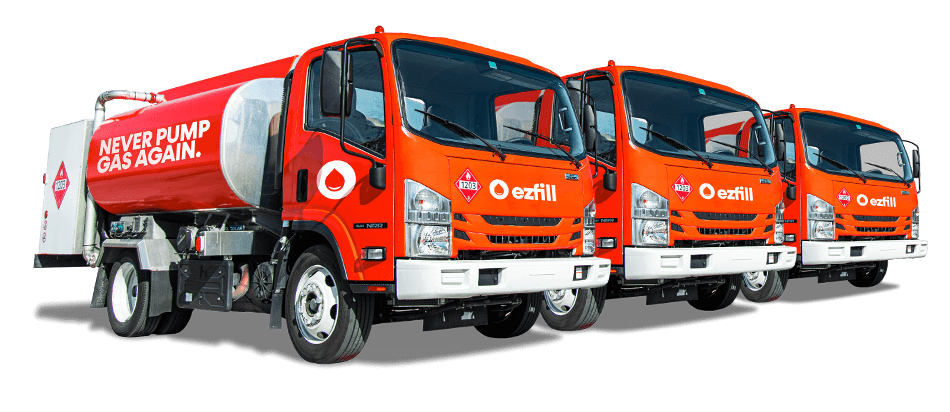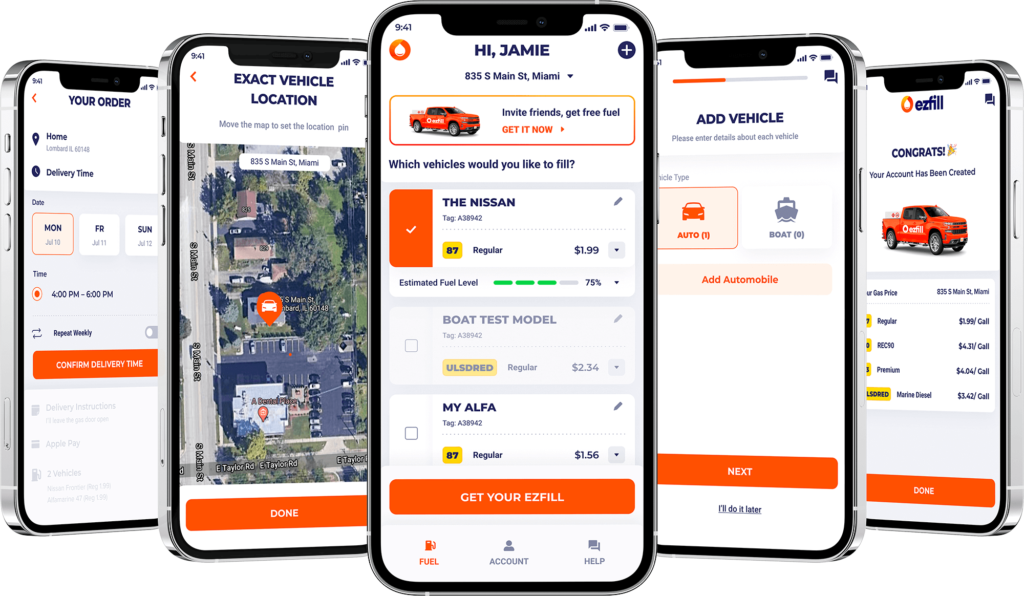Reducing fleet fuel costs can significantly boost your bottom line. In this article, we’ll cover practical strategies on how to reduce fleet fuel costs effectively, such as optimizing routes, implementing fuel-efficient driving techniques, and using telematics systems. With EzFill, you’ll learn actionable steps to manage fuel consumption better and save money—while enjoying the convenience of mobile fuel delivery directly to your fleet.
Key Takeaways
- Optimizing routes and utilizing telematics can significantly reduce fuel consumption, improving overall fleet efficiency by decreasing average mileage by about 10%.
- Implementing fuel-efficient driving techniques and regular vehicle maintenance improves fuel economy and reduces operational costs.
- Investing in alternative fuel vehicles and using bulk fuel purchasing strategies can further lower expenses while aligning with environmental sustainability goals.
- EzFill’s mobile fuel delivery ensures your fleet remains ready to go without unnecessary trips to the gas station, saving time, and money, and reducing environmental impact.
Optimize Fleet Routes
Optimizing fleet vehicle routes effectively reduces fuel consumption. GPS tracking systems provide real-time information, allowing fleets to adjust their routes dynamically based on traffic conditions, minimizing idling and maximizing efficient movement.
Route planning software enables fleet managers to create routes that minimize travel time and fuel usage. These smart tools can accommodate last-minute schedule changes, maintaining efficiency even during peak tourist seasons.
Telematics systems enhance route optimization by reducing unnecessary fuel consumption by minimizing empty miles and improving delivery times. Effective routing can decrease average mileage by about 10%, leading to cost savings and better fuel efficiency.
Implement Fuel-Efficient Driving Techniques
Driving techniques significantly impact fuel efficiency. Monitoring driver behavior through telematics enables targeted coaching, promotes fuel-efficient habits, and enhances overall fleet performance.
Educating and training drivers on telematics systems ensures their effective use. Informed drivers are more likely to utilize these systems correctly, resulting in safer and more fuel-efficient driving.
Techniques like maintaining a constant speed, using cruise control, and progressive shifting can greatly improve fuel efficiency. For example, changing gears at lower RPMs optimizes fuel usage and reduces engine strain, while keeping a constant speed on flat surfaces enhances fuel economy.
Reducing engine idling time is crucial. Modern engines do not require prolonged idling during breaks, and Florida’s warm climate minimizes the need for winter idling, allowing fleet operators to save on fuel.
Utilize Telematics Systems
Telematics systems are the cornerstone of modern fleet management. They integrate GPS tracking with onboard diagnostics to gather comprehensive data on vehicle performance and driver actions. This integration offers real-time fuel consumption and efficiency analytics, providing fleet managers with valuable insights.
A fuel management system through telematics offers substantial benefits. Managers can monitor vehicle performance and driver behavior, optimizing routes and identifying areas for fuel efficiency improvements. This data-driven approach ensures peak efficiency, reducing unnecessary fuel usage and maintenance costs through a fuel management program.
Telematics analysis of driving behavior and vehicle performance aids in targeted coaching and interventions, leading to sustained improvements in fuel efficiency and overall fleet health.
Invest in Alternative Fuel Vehicles
Investing in alternative fuel vehicles offers both financial and environmental benefits. Florida provides incentives for fleets adopting alternative fuel vehicles, including tax credits and grants, making the initial investment more manageable.
These incentives and operational advantages, like access to high-occupancy vehicle lanes regardless of passenger count, make alternative fuel vehicles and electric vehicles attractive options for fleet managers. The Florida Department of Environmental Protection also supports initiatives to increase the use of alternative fuels, enhancing environmental sustainability.
Local Clean Cities coalitions in Florida provide valuable information on grants and funding opportunities, helping fleets transition to more sustainable fuel options. This move reduces fuel costs and aligns with broader environmental goals.
Use Fuel Cards for Better Control
Fuel cards are essential tools for fleet managers. They provide enhanced control over fuel expenses and simplify expense management. They also offer improved oversight of fuel and maintenance expenses, allowing managers to spot inefficiencies and areas of overspending.
Fuel cards eliminate the need for cash or personal credit card use for drivers, adding convenience and security. Each fuel purchase made with a fuel card captures detailed data, enhancing reporting capabilities for fleet managers and enabling better decision-making.
Fleets can use fuel cards to control their fuel spend, identify cost-saving opportunities, and streamline administrative tasks.
Maintain Vehicle Health
Maintaining vehicle health optimizes fuel efficiency. Regular maintenance, such as timely oil changes and clean air filters, keeps engines running efficiently, minimizing fuel consumption. Preventative maintenance supported by telematics ensures vehicles remain in optimal condition over time.
Checks on components like brakes, fluids, and tire inflation play a significant role in fuel economy. Proper tire pressure can lead to substantial fuel savings, while well-maintained brakes and fluid levels contribute to efficient fuel usage.
Addressing maintenance issues promptly can prevent expensive repairs and reduce downtime, ensuring vehicles remain operational and efficient. Proper wheel alignment enhances vehicle handling and reduces drag, further improving fuel efficiency.
Monitor and Analyze Fuel Data
Analyzing fuel data is crucial for continuous improvement in fleet fuel management. Fleet managers can compare their fuel data against state averages and similar fleets to identify areas for improvement. Analytical tools assist in identifying trends and opportunities for cost reduction.
Regularly reviewing fuel usage data can refine management policies and highlight areas for efficiency gains. Detailed transaction data analysis informs future vehicle selection, helping to reduce the fleet’s fuel consumption.
Promoting a culture of fuel efficiency among drivers enhances data analysis outcomes and supports better fuel management practices.
Bulk Fuel Purchases
Bulk fuel purchasing is an effective strategy to reduce fleet fuel costs. By purchasing fuel in bulk, fleets can secure the best pricing on gas, diesel fuel, and alternative fuels, significantly lowering overall expenses.
Contracting with suppliers like EzFill allows fleets to lock in competitive rates and protect against price fluctuations, ensuring financial stability and predictability. Partnerships with local fuel suppliers can further enhance cost savings with competitive pricing structures.
Implementing bulk fuel purchasing and supplier contracts can lead to sustainable reductions in a fleet’s overall fuel spend, ensuring long-term cost savings and operational efficiency.

Leverage Mobile Fuel Delivery Services from EzFill
Our mobile fuel delivery services at EzFill revolutionize fleet fueling needs. Instead of requiring fleet drivers to make time-consuming trips to gas stations, EzFill brings the gas directly to your vehicles. Simply set up your delivery order on the EzFill app, and fuel will be delivered straight to your vehicle’s fuel door.
This service eliminates unnecessary fuel transfers and environmental risks associated with traditional gas stations, which experience an average of 40-gallon spills each year. By reducing these spills and avoiding underground fuel storage, EzFill offers a more sustainable fuel solution. Our fleet refueling programs, managed by licensed and certified EzTechs, are designed to enhance both convenience and efficiency.
EzFill’s customizable refueling programs and user-friendly app enhance convenience for fleet managers and drivers. Fleet operators also benefit from lower fuel costs through fixed, negotiated rates, shielding businesses from market fluctuations.
With the ability to set up gas delivery orders directly to a vehicle’s fuel door and a customizable refueling program tailored to your fleet’s needs, we at EzFill help ensure your vehicles are always ready to hit the road.

Contact EzFill
Connect with our team today to explore how EzFill can drive your fleet towards substantial fuel savings and operational efficiency. Our expertise in mobile fuel delivery and comprehensive fuel management solutions empowers fleet managers to achieve more with less. Contact us now to discover how we can tailor our services to meet your unique needs and propel your fleet operations into a cost-effective future.
Frequently Asked Questions
What is EzFill?
EzFill is a mobile fuel delivery service that brings gas directly to your location, eliminating the need for a trip to a gas station. This convenience allows you to save time and effort while refueling your vehicle.
How can fleet managers benefit from using telematics systems?
Fleet managers can significantly enhance their operations by using telematics systems, as they allow for real-time monitoring of vehicle performance and driver behavior, leading to optimized fuel usage and improved overall efficiency.
What are the advantages of using fuel cards?
Using fuel cards offers enhanced control over fuel costs, better expense tracking, and increased convenience for drivers. This streamlined approach can significantly improve fleet management.
How can bulk fuel purchases reduce costs?
Bulk fuel purchases enable fleets to negotiate lower prices, which significantly cuts overall fuel expenses. This strategy can lead to substantial savings for businesses.
What incentives are available for investing in alternative fuel vehicles in Florida?
Investing in alternative fuel vehicles in Florida comes with various incentives, including tax credits and grants. These initiatives are designed to encourage the adoption of more sustainable transportation options.


